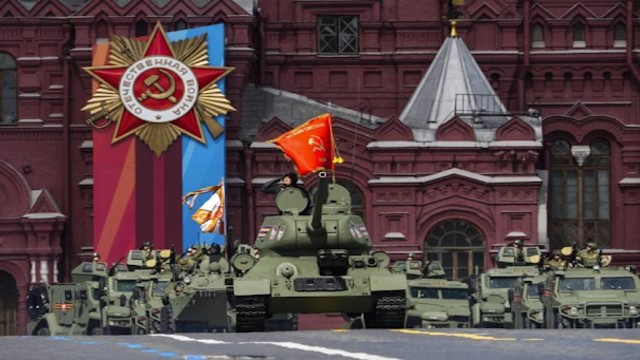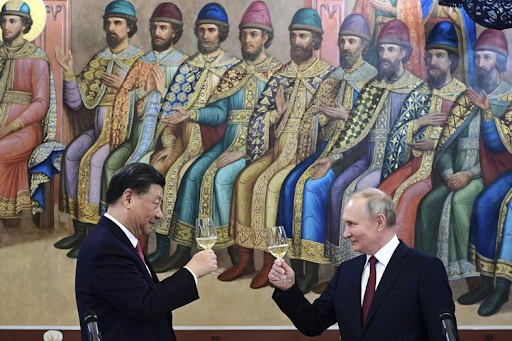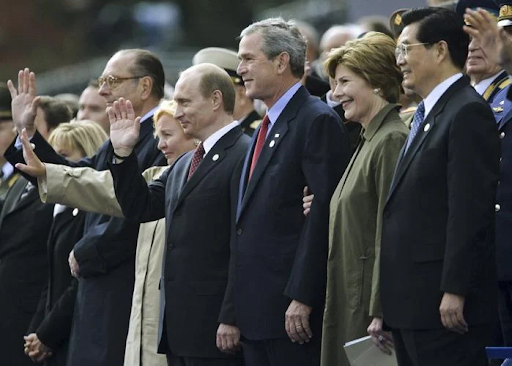
A Soviet-era tank and armored military vehicles participate in a Victory Day parade dress rehearsal at Red Square in Moscow on May 5, 2024. (AP Photo)
Russia is preparing for a high-profile WWII Victory Day celebration on May 9, marking 80 years since Nazi Germany's defeat. The event will be more than a historic commemoration—it’s a bold display of Russia’s global alliances in a time of intense geopolitical division.
WWII Victory Day — A Day of Military Might and Political Messaging
Victory Day is Russia’s biggest secular holiday. It features a grand military parade through Red Square, showcasing both strength and symbolism. This year, President Vladimir Putin aims to underline Russia’s growing partnerships, especially as Western relations remain fractured due to the ongoing war in Ukraine.
Political analyst Nikolai Petrov summed it up: “For Putin, this is about showing Russia’s broad international backing.”
China’s Xi Jinping: The Star Guest
Among the visiting leaders, Chinese President Xi Jinping is the most prominent. Putin has described Xi as “our main guest.” The two leaders will hold a bilateral summit, discussing trade, global issues, and cooperation within BRICS—a bloc that’s expanded beyond its original five members.
Xi is visiting Moscow for four days. The trip reflects the deepening ties between Russia and China. The two have met over 40 times and built a strong personal rapport. Their “strategic partnership” has grown as both face pressure from the West.

China has not sent arms to Russia but has become a key economic partner. It buys Russian oil and gas, while supplying vital machinery and electronics—crucial since Western sanctions cut off high-tech exports. Beijing has also backed Russia diplomatically and condemned sanctions.
India Stays Cautious Amid Conflicting Interests
Indian Prime Minister Narendra Modi was expected to attend but cancelled his trip. Tensions with Pakistan following an attack in Kashmir kept him at home. Still, India remains an important Russian partner.
New Delhi maintains its defense ties with Moscow, dating back to the Cold War. Since the Ukraine invasion, India has also increased oil imports from Russia. Yet, India watches the tightening Russia-China bond with growing concern, especially given its own strained ties with Beijing.
Brazil Returns to Moscow
Brazil’s President Luiz Inácio Lula da Silva is making his first visit to Russia since the war began. He previously visited Moscow twice during his earlier presidency (2003–2010). His presence reinforces the growing BRICS alliance and Brazil’s willingness to engage diplomatically with Russia.
Support from Europe’s Fringe and the Global South
Despite EU pressure, Slovakia’s populist Prime Minister Robert Fico plans to attend the celebration of WWII Victory Day. He has openly criticized EU policy on Ukraine and asserted his independence, saying, “Nobody can order me where to go or not to go.”
Serbia’s President Aleksandar Vucic has also accepted the Kremlin’s invitation. Though his travel plans are uncertain due to illness, the Kremlin announced a scheduled meeting between him and Putin.
Petrov sees such visits as proof that Russia isn’t isolated. “It shows support not only from the Global South but also from some European quarters,” he said.
Also on the guest list are leaders from Cuba, Vietnam, Venezuela, Burkina Faso, and several former Soviet republics. Kremlin spokesman Dmitry Peskov emphasized the symbolic weight of the gathering, saying it reflects shared values and visions.
Bilateral Talks on the Sidelines
Putin is expected to hold more than 15 one-on-one meetings during the event of the WWII Victory Day celebration. Leaders from 29 countries have confirmed attendance. Even the U.S. ambassador in Moscow, Lynne Tracy, was invited, though her participation remains unconfirmed.
From Western Presence to Absence
The contrast with past Victory Days is stark. In the 1990s and 2000s, leaders from the U.S., UK, Canada, France, and Germany regularly appeared in Moscow. Former U.S. presidents like Bill Clinton and George W. Bush walked Red Square as guests of honor.
That changed after Russia’s 2014 annexation of Crimea. Western attendance ceased. This year, U.S. President Joe Biden is not attending. Even Donald Trump—despite shifting views on isolating Russia—will be absent.

In this image provided by the White House, President George W. Bush, third from right, and first lady Laura Bush, second from right, stand with Russian President Vladimir Putin, fourth from right, and his wife, Lyudmila, while watching the Victory Day parade in Moscow's Red Square on May 9, 2005. French President Jacques Chirac is seen at left, and Chinese President Hu Jintao is at right. (AP Photo)
A Global Show of Defiance and Alignment
This WWII Victory Day is about more than history. It is a clear message from Moscow that it has allies—and is determined to show them to the world.















